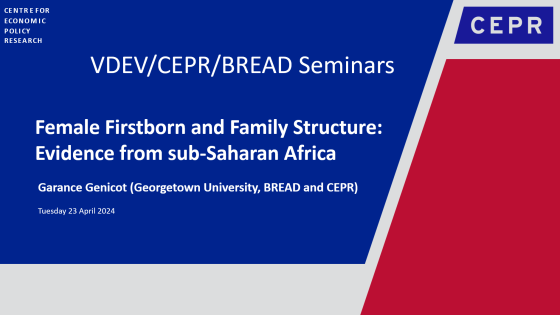In the last decade or so, substantial innovations have taken place in the way social protection policies are designed and implemented. As their overall objective is to help the poor escape poverty permanently, concerns about the development impact of such interventions are becoming increasingly important (Hanlon et al. 2010).
Among social protection policies, conditional cash transfer programmes are undoubtedly one of the most important innovations. These programmes are designed to achieve broad development objectives. The number of countries implementing conditional cash transfer programmes is rapidly growing, from about 3 in 1997 to more than 30 a decade later. Their most innovative aspects are that:
- these transfers are often paid in cash (as opposed to “in kind”),
- they are targeted (usually to the poor and, especially, to women in households with children),
- they have an explicit poverty reduction objective (they aim at alleviating poverty in the short-run through the transfers themselves, and to alleviate long-run poverty by linking the receipt of such transfers to investments in human capital),
- they have an explicit conditionality component (the receipt of further transfers is often conditional on, for instance, school attendance and visits to health centres), and
- they contain in their design a very strong ex-post evaluation component.
One particularly innovative component of these programmes that has received scant attention in the literature is their potential to foster financial inclusion. One example of this relative inattention is that the World Bank has recently produced an authoritative and comprehensive (almost 400 pages) assessment of conditional cash transfer programmes (Fiszbein and Schady 2009) which does not discuss financial inclusion and financial access in depth.
The view that financial sectors may play a marginal role in poor countries is one possible reason for such lack of attention to the relation between cash transfers and financial development. Yet such a view underestimates the financial sector dynamics in poor countries, especially in Sub-Saharan Africa. Starting from a very low base, the financial sector is developing fast in low income countries thanks in no small part to the adoption of new technologies, such as mobile phone banking and internet banking (Beck et al. 2009).
In recent research (Campos and Coricelli 2010), we attempt to address this neglect of financial development as a possible factor explaining the success of cash transfers. Indeed, we lament the generalised lack of attention and interest in its potential role. Our argument is that cash transfers, through the formal financial sector, may be an important channel to boost financial development and thus potentially reconcile equity and efficiency concerns.
Our thinking is in large part inspired by some of the most successful cash transfer programmes, such as the Brazilian Bolsa Família programme. One delivery instrument in Bolsa Família has been electronic benefit cards (there is an ongoing study on the possibility of using mobile phones for executing these payments). In this, as in other successful programmes around the world, the beneficiaries, mainly women, have their benefits paid periodically into bank accounts, which is controlled through a dedicated ATM system (Lindert et al. 2007). We argue that the way in which these benefits are executed (or paid) matters considerably, and deserves further attention from both academics and policymakers.
Our intuition is as follows. The financial sector can play a central role in maximising the development impact and the effective delivery of social protection policies. This is because appropriate financial sector policies enable transparent, cost-effective and well-targeted social transfers. In addition, the implementation of social transfers through the formal financial sector can create positive and substantial spillovers on financial development itself.
The view we take is that there is a largely-unexplored virtuous cycle of conditional cash transfer programmes and financial development. Conditional cash transfers can improve access to financial services, which, in turn, can shore up financial deepening, which may lower transaction costs in the financial sector (for example, by lowering the ratio of banking fees to GDP per capita). Cheaper banking services are not only one way of improving access to finance and of fostering financial inclusion, but they may also help to support cash transfer programmes by making their delivery cheaper and more transparent. Clearly, there are important political economy issues permeating these decisions.
These qualifiers above are useful as they highlight the important policy areas. Conditional cash transfer programmes can improve financial inclusion if and when the payment of the benefits is done through the formal banking system (as opposed to a surprisingly still common way of paying beneficiaries in cash and in person). Financial inclusion can shore up financial deepening if, for instance, bank regulations are able to relax branching restrictions and allow (or lower the costs) for the operation of mobile phone-based banking systems. Financial deepening can lower banking costs, but policymakers have to focus on the ways in which these cost reductions are actually passed on to low-income consumers (by, for example, subsidising basic banking accounts, if that is required). Lower costs of formal financial services can clearly improve access. They are also likely to reduce the implementation costs of conditional cash transfer programmes, thereby enhancing their potential effectiveness.
It is fair to say that the impact of social transfers on financial access has not featured as a central aspect of social safety-net design in low- and middle-income countries, where exploiting such links would likely be most beneficial. Not surprisingly, it has also not featured in the evaluations of these programmes. Furthermore, we find that financial inclusion studies do not try to encompass conditional cash transfers, while the programme's evaluation efforts tend not to include information on the access to formal or informal financial services. This makes it difficult to perform a direct test of the strength of this link. Our search for evidence has taken us from Sub-Saharan Africa and the Finscope Project to the Social Protection Network (Red de Protección Social) in Nicaragua.
In conclusion, the possibility that the relationship between conditional cash transfer programmes and financial development can be mutually beneficial has been so far largely ignored. On the growing work on access to finance, there is little consideration about the role that social protection policies, in general, and cash transfer programmes, in particular, can potentially play. Likewise, examining the vast body of evaluation datasets of conditional cash transfer programmes, there is little thinking about the possibility that financial inclusion can be an important outcome.
Econometric evidence on the effects of cash transfers on financial behaviour is not yet widely-available and should feature as a high priority in both future research and on the policy agenda. If this evidence is found to support the hypothesis we put forward in this column (that there is a powerful complementarity between financial development and social protection policies), this will open a new range of policy options with deep and widespread consequences for some of poorest countries in the world.
References
Beck, T, M Fuchs and M Uy (2009), “Finance in Africa: Achievements and Challenges”, in The Africa Competitiveness Report 2009, World Economic Forum.
Campos, N and F Coricelli (2010), “How to Maximise the Development Impact of Social Protection Policies in Africa? The Role of Financial Development”, Background Paper to the European Report on Development 2010.
Fiszbein, A and N Schady (2009), Conditional Cash Transfers: Reducing Present and Future Poverty, The World Bank.
Hanlon, J, A Barrientos and D Hulme (2010), Just Give Money to the Poor: The Development Revolution from the Global South, Sterling VA, Kumarian Press.
Lindert, K, A Linder, J Hobbs and B de la Brière (2007), “The Nuts and Bolts of Brazil’s Bolsa Família Program: Implementing Conditional Cash Transfers in a Decentralized Context”, World Bank SP DP 0709.



